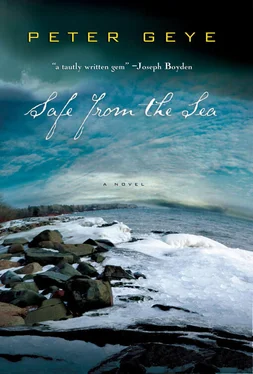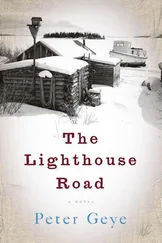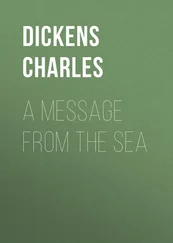AFTER BREAKFAST NAT was ready to leave. She stood at the open door of her rental car and bade Olaf thanks. Noah tossed her bag into the backseat of the car. She kissed Olaf on the cheek. She kissed Noah on the lips. She squeezed his hand.
“Stay over on the right side of the road here,” Olaf said, pointing to the side of the trail up from the cabin with the most traction. “That track’s damn near washed out. And be careful driving back to Duluth on 61. The deer will be out for breakfast themselves. They sit in the ditch next to the road.” Olaf moved toward the house. “I’m going inside. It was good to see you. Thanks again for supper last night. It beat hell out of instant mashed potatoes.” “We’ll do it again sometime,” Nat said.
Olaf nodded. “Good-bye.”
Nat smiled. “Well, I better get going. It’s two lefts and a right, right?” “A right at Lake Superior.” He handed her the package holding the agate. “Open this on the plane. It’s no big deal.” She put her arms around his shoulders and hugged him. He hugged her back very hard. Her car trundled up the road, slipping into the ruts, the wheels spinning, but she was gone in a moment.
All day Olaf slept while Noah split and stacked wood. Vikar had emerged from the woods to watch, and at noon Noah fed him a bucket of food. His own lunch he took to the top of the ski jump again, leftover black pot and unbuttered lefse , the remains of the smoked salmon. Vikar followed him but would not climb the scaffold. After lunch he went back to the gulch to inspect the oak. He tried to devise a plan but realized he needed a much bigger saw, it was as simple as that. He would ask his father about it.
He checked on his father at one o’clock. The old man still slept, deeply but with great agitation. Noah went down to the lake to fish. He rowed across the lake to the spot off the cliff. He cast his line, waited, and jerked the jig across the bottom of the first step. For two hours he cast his line up the step. And for the second time in as many efforts he didn’t catch a thing.
THE SUV PARKED in the yard had North Dakota plates.
Inside, Solveig sat on the sofa beside their father, her arm around him. Olaf, his eyes glassy, his hair messed from the long day of sleep, looked both thrilled and desperate. “I wish you wouldn’t have asked her to come,” Olaf said before either of his children could speak.
“I didn’t ask her to come.”
“Of course I’d come, Dad.” She put her hand through his hair.
“Well, there’s no need to sulk,” Olaf said.
“Come on, Dad,” Noah said.
“I’m okay,” Solveig almost sang. “I’m glad I’m here.”
“When did you get here?”
“Just now. I can only stay for a couple days. The kids are with Tom’s folks.” She took a deep breath, trying, Noah saw, to stave off tears.
“You just missed Nat — it’s a long story. But this is great,” he said. “Here we all are.”
As pleasant as the previous night had been, this night was dour. Solveig, for her part, seemed immobilized by her grief at the sight of the old man. No question he had worsened from the day before, but even Noah thought his sister’s worry exaggerated. Olaf could hardly stand it. The thought occurred to Noah that Solveig — with her fretting melodrama — was handling her father’s illness much as his mother had handled the morning of the wreck so many years ago. Though in many ways she was as sweet and incorruptible as his mother, Solveig was also the child of a different generation, and what had been forgivable in his mother was less so in his sister.
Instead of eating dinner the three of them snacked intermittently on leftovers from the night before. They seemed incapable of coherent conversation. Finally Olaf asked Noah to bring the piano in from the porch.
The old Acrosonic sat in a corner, buried beneath mounds of junk — a fishing net, empty boot boxes, a telescope with a cracked lens, empty bags of dog food, a spare truck tire — against the lake wall. Noah cleared a path, unlocked the wheels on the legs of the piano, and rolled it into the living room. A long time ago, Noah remembered, the piano had been refinished with a deep, wine-colored varnish. Now the glassy finish was obscured and gauzelike.
“It’s a ghost piano,” Noah said. “Doesn’t it look like a ghost?”
“Been on that porch for the better part of ten years,” Olaf said. “I should have taken better care of it.”
“It’s not as if you play, Dad,” Solveig said. “And besides, this house isn’t exactly built for a piano. They take up a lot of room.”
“Even so,” Olaf said, “it’s a shame.”
Noah had wheeled it across the floor and was positioning it against the wall. “Toss me a dishrag,” he said to Solveig, who stood at the kitchen counter now with her hands on her hips. She flipped him the rag.
Noah had hoped that dusting it off and getting it in the soft lamplight might restore some of its luster. But it looked perhaps even worse. When he lifted the cover off the keys and stood over them playing “Chopsticks,” its wail startled him. Every third or fourth key failed to strike any note at all, and the keys that did hit the strings sounded more like shrieks than music.
He looked over his shoulder at Solveig, who covered her ears with her hands. “We’ll get a piano tuner up here. You can’t play on this now.” He stood, closed the keyboard cover, and wiped his hands on his pants.
“Good luck getting a piano tuner up here,” Olaf said. “You’re in Misquah, not Boston or Fargo.”
“Don’t be ridiculous,” Noah said as he headed back onto the porch to retrieve the bench. “We’ll find a piano tuner.”
As he rummaged through the mounds of rubbish he could hear Solveig giving the piano another try, some wail approximating a classical number. By the time he’d found the bench under an old kerosene stove, Solveig had mercifully quit playing. He lugged the bench into the living room, set it before the piano, and wiped his hands. “We’ve got to clean that porch up,” Noah said.
Olaf said nothing, a look of despondency conveying all. He stood, kissed Solveig atop the head, and adjourned to his bedroom.
Noah and Solveig sat opposite each other on the sofa. Noah was flushed again from the heat of the fire. He felt exhausted beyond sleep. “I’m not wrong about this, am I?” he said. “He’s as bad as I thought, right?”
“I think so,” Solveig said. Her voice quavered, but she kept from crying.
“He’s building some goddamn contraption out in the shed.”
“I know. He told me that he wants you to bury him in the lake.” She paused. “We can’t bury him in the lake, Noah.”
Noah nodded half yes, half no.
“I told him we would bury him properly in a cemetery. I told him he didn’t need to do an eternal penance for something that happened so long ago and was entirely out of his control.”
“I bet he loved hearing that.”
“He didn’t say anything.”
“Of course he didn’t.”
She folded the afghan and draped it over the back of the sofa. “I talked to Tom about having him come stay with us. He was wonderful. He said he’d do whatever I wanted, that we could hire a nurse to live with us.”
“That’s awfully generous.”
“I’m sure there’s no way Dad’ll do it, though,” she said. “He’s got other plans in mind now. I can see that clearly.”
Olaf came out of his bedroom. He stepped outside and returned in a moment. He prepared the water and effervescing tablets for his teeth. He said good-night again.
“Where were we?” Solveig said.
“We were getting nowhere,” Noah replied.
They talked for a couple of hours about what to do before they went to bed. Solveig was inconsolable. Noah finally realized how necessary sleep was. His body ached. Somewhere in the intersection of his fatigue and forlornness he caught a glimpse of the old man’s reason, saw how it might all play out.
Читать дальше












